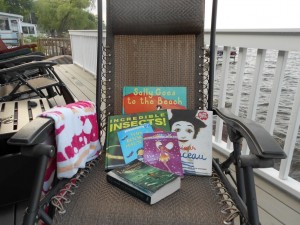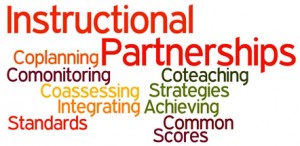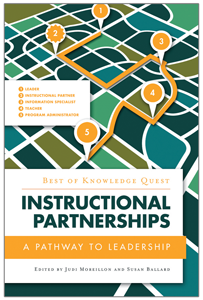 Dreaming of summer vacation? We all do, but summer break for some students may mean they will come back in the fall at a disadvantage. When the final bell signals the end of the school year, teachers, school and public librarians, parents, community members, and administrators should have a plan in place to support readers during the two month hiatus. Remember the adage, “it takes a village…” Collaboration between all these groups should promote access to reading materials even while school is not is session, and research shows that children benefit from having books in the home. Richard Allington, reading researcher and consultant, is the co-author of a new book, Summer Reading: Closing the Rich/Poor Achievement Reading Gap (Teachers College and International Reading Association, 2013). In a recent SLJ blog, Curriculum Connections, (Eames, June 4, 2013) Allington answers questions and offers ideas for making a difference, and shows how all the stakeholders can collaborate for student success. Be sure to put this book on your summer reading list!
Dreaming of summer vacation? We all do, but summer break for some students may mean they will come back in the fall at a disadvantage. When the final bell signals the end of the school year, teachers, school and public librarians, parents, community members, and administrators should have a plan in place to support readers during the two month hiatus. Remember the adage, “it takes a village…” Collaboration between all these groups should promote access to reading materials even while school is not is session, and research shows that children benefit from having books in the home. Richard Allington, reading researcher and consultant, is the co-author of a new book, Summer Reading: Closing the Rich/Poor Achievement Reading Gap (Teachers College and International Reading Association, 2013). In a recent SLJ blog, Curriculum Connections, (Eames, June 4, 2013) Allington answers questions and offers ideas for making a difference, and shows how all the stakeholders can collaborate for student success. Be sure to put this book on your summer reading list!
In order to ensure that all children have opportunities to maintain literacy skills and fluency, we may need to change our school policies about materials that are usually locked away during the summer, and to find other creative ways to make sure books get into the hands of those kids who need them most, even if we risk losing some resources.
This is a topic of conversation that surfaces in school library circles in late spring-early summer. Here are some ideas that have appeared recently within a variety listservs, blogs, and twitter.
- Students are allowed to check out a certain number of books for the summer, returning them in the fall.
- Genres of books are loaned to the public library for summer circulation.
- Promotion of public library spaces, programs, and collections. Students get public library cards before they leave for the summer. Some classes visit local public library, are introduced to librarians and programs for youth.
- Some school libraries are open to students, parents, teachers for self selection and self checkout when the building is open, even if the teacher librarian is not there.
- Summer reading blogs/social media sites for students offer a virtual space for sharing ideas and thoughts about books and other materials.
- Newsletters and suggested reading lists (print and electronic) inform students, teachers, parents, administrators, and community members about summer reading.
- Joint programs between school and public librarians are funded by grants.
- Joint programs with local social support networks for children, such as Boys’ and Girls’ Clubs, YM/YWCAs, etc.
- Little Free Libraries in neighborhoods, grocery stores, malls, etc.
And just for fun, here a couple of examples of what’s happening here in Vermont:
Beth Redford, school librarian at the Richmond (VT) Elementary School has a book bag program for all her students, K-4. They are allowed to select ten books to take home for the summer. Kids are really excited to participate.
Steve Madden, school librarian at the Camel’s Hump Middle School in Richmond, VT, has collaborated with the Vermont Department of Libraries and the Children’s Literacy Foundation, to write grants to construct and supply book collections for the Bolton Little Free Libraries. Based on the Little Free Libraries in Wisconsin and elsewhere, book collections are set up in small enclosed bookcases in areas of Bolton, a town with no public library. Steve continues to refresh the collections that operate on the trust system. His bike is set up for summer deliveries, too. Little Free Libraries have sprouted up in lots of places in Vermont. Is there one in your neighborhood? Would you like to start one?
What’s on your summer reading list?
References:
Allington, R. and McGill-Franzen, A. (2013) Summer reading: Closing the rich/poor achievement gap. New York: Teachers College Press.
CLiF stocks little free libraries in Bolton, VT. (2012, July 3). Inspire kids! Children’s Literacy Foundation blog. (Blog). Retrieved from http://clifonline.wordpress.com/2012/07/03/clif-stocks-little-free-libraries-in-bolton-vt/
Eames, A. (2013, June 4) Summer reading: closing the rich/poor achievement gap/ An educator responds to questions. Curriculum Connections SLJ blog. (Blog). Retrieved from http://www.slj.com/2013/06/curriculum-connections/summer-reading-and-the-richpoor-achievement-gap-an-educator-responds-to-questions/
Kelley, Kevin. (2013, June 12). At Vermont’s little free libraries, books aren’t going away. Seven Days online. (Blog). Retrieved from http://www.7dvt.com/2013vermonts-little-free-libraries-books-arent-going-away
Little Free Library website. (2013, June 24) Retrieved from http://www.littlefreelibrary.org/
Redford, Beth. (2013, June 10) RES newsletter. (Blog) Retrieved from: http://reslibrarynews.blogspot.com/2013/06/summer-library-books-resvt-cesuvt-vted.html?spref=tw



